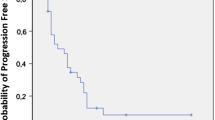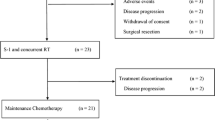Summary
BACKGROUND: The aim of this phase-II study was to evaluate the efficacy of gemcitabine monochemotherapy in patients with metastasized pancreatic carcinoma known to have a poor overall tumor response rate to chemotherapy in order to achieve an improvement in the quality of life. METHODS: In 28 patients with metastasized pancreatic carcinoma (mean age, 63.7 years; range, 37 to 77 years; sex ratio, 13 males, 15 females), systemic chemotherapy with gemcitabine (dose, 1000 mg/m2) was administered on day 1, 8 and 15. After one further week (day 29), the cycle was repeated. After each 2nd cycle, extension of tumor growth (restaging) including radiological imaging (ultrasound, computed tomography, plain film of the thorax) and laboratory analysis (tumor marker) was performed. Frequency, severity and spectrum of side effects were assessed according to WHO grading prior to each treatment. Quality of life was evaluated using standardized questionnaires. RESULTS: All in all, 106 chemotherapeutic cycles were administered in 28 patients (range, 1–18 cycles; mean, 3.78). While in no patient complete remission was observed, 2 out of 28 patients showed partial remission (7.2 %). In 11 out of 28 patients, stable tumor disease was detected (39.2 %). Fifteen out of 28 patients (53.6 %) showed progressive tumor growth. Four out of 28 patients lived longer than 1 year (1-year survival rate, 14.3 %). Side effects of the chemotherapy were only moderate. Only in 26 of 106 cycles (26.5 %), side effects were documented. Significant improvement in the quality of life was reported in 25 % of the treated patients. CONCLUSIONS: Chemotherapy using gemcitabine is a well tolerable treatment option with a minimal rate of side effects in the case of metastasized pancreatic carcinoma. However, overall response rate is low. Even considering the acceptable median survival time of 9.1 months most likely caused by second-line chemotherapy, optimization of gemcitabine monotherapy appears to be required using a combination with a further potential cytostatic drug.
Zusammenfassung
GRUNDLAGEN: Seit Einführung des Zytostatikums Gemcitabin wird diese Substanz am häufigsten in der palliativen systemischen Chemotherapie des metastasierten Pankreaskarzinoms verwendet. Trotz niedriger Tumoransprechrate verfügten die behandelten Patienten über eine verbesserte Lebensqualität bei nur geringer Verlängerung der Überlebenszeit. Ziel dieser Phase-II-Studie ist es, die Wirksamkeit einer Gemcitabin-Monochemotherapie bei Patienten mit einem metastasierten Pankreaskarzinom unter besonderer Berücksichtigung der Lebensqualität zu untersuchen. METHODIK: Die systemische Chemotherapie mit Gemcitabin wurde bei 28 Patienten mit einem metastasierten Pankreaskarzinom eingesetzt (Durchschnittsalter: 63,7 Jahre; Bereich: 37–77 Jahre; Geschlechtsverhältnis: 15 Frauen, 13 Männer). 15-mal handelte es sich um ein primär metastasiertes Stadium, 13 Patienten hatten Rezidive und Metastasen nach vorangegangener Resektion. Gemcitabin wurde in einer Dosierung von 1000 mg/m2 am Tag 1, 8 und 15 intravenös appliziert, nach einer einwöchigen Pause wurde der Zyklus am Tag 29 wiederholt. Nach jedem zweiten Zyklus erfolgte ein Restaging (Sonographie, Computertomographie, Thorax-Röntgen, Tumormarker). Die Einschätzung der Nebenwirkungen nach WHO und der Lebensqualität mittels Fragebogen erfolgte vor jeder Behandlung. ERGEBNISSE: 28 Patienten erhielten 106 Therapiezyklen (Bereich: 1–18; Mittelwert: 3,78). 2 von 28 Patienten hatten eine partielle Remission (7,2 %). Bei weiteren 11 von 28 Patienten war eine „Stable Disease“ nachweisbar (39,2 %). Über die Hälfte der Patienten (15/28: 53,6 %) hatten primär einen Progress des Tumors. Die sehr lange mediane Überlebenszeit von 9,0 Monaten (Bereich: 1,1–21,0 Monate) wird zum Teil mit einer „Second“- und „Third-Line“-Chemotherapie bei 7 Patienten begründet. 4 von den 28 Patienten überlebten 1 Jahr (1-Jahres-Überlebensrate: 14,3 %). Die Nebenwirkungen der Chemotherapie waren sehr gering. Nur in 26 von 106 Zyklen wurden Nebenwirkungen, überwiegend WHO-Grad I und selten WHO-Grad II, registriert und nur in 4 Zyklen trat eine Nebenwirkung nach WHO-Grad III auf (Übelkeit, Leukozytopenie). Die Verbesserung der Lebensqualität wurde von 25 % der behandelten Patienten angegeben. SCHLUSSFOLGERUNGEN: Die Chemotherapie mit Gemcitabin ist eine sehr gut verträgliche, nebenwirkungsarme Therapie beim metastasierten Pankreaskarzinom. Die objektive Tumoransprechrate ist gering. Auch wenn ein relativ langes medianes Überleben von 9,0 Monaten gesichert wurde, ist deshalb die Optimierung der Gemcitabin-Monochemotherapie z. B. durch Kombination mit anderen Zytostatika notwendig.
Similar content being viewed by others
Author information
Authors and Affiliations
Corresponding author
Rights and permissions
About this article
Cite this article
Meyer, F., Eichelmann, K., Lippert, H. et al. Phase-II Trial Using Gemcitabine as Monochemotherapy in Patients with Metastasized Pancreatic Carcinoma. Eur Surg 35, 337–341 (2003). https://doi.org/10.1007/s10353-003-0044-5
Issue Date:
DOI: https://doi.org/10.1007/s10353-003-0044-5




